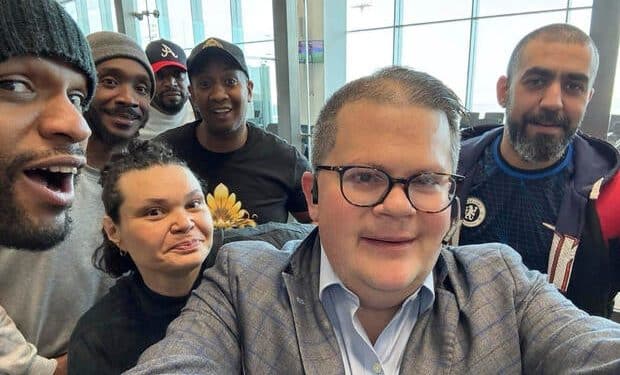Kuwait released a group American prisoners including veterans and military contractors who had been jailed on drug-related charges for years, a representative of the detainees informed The Associated Press Wednesday. The move was seen as a sign of goodwill by two allies.
At least six U.S. citizens have been released following a recent trip to the region made by Adam Boehler. The top hostage envoy for the Trump administration, Boehler is also pushing the U.S. government to return American citizens imprisoned abroad.
Jonathan Franks, who is a private consultant and works on cases of American hostages or detainees in Kuwait who were there to secure their release, accompanied six newly released prisoners on the flight from Kuwait back to New York.
Franks stated in a press release that “my clients and their families” were grateful for the Kuwaiti government’s humanitarian gesture. He said that his clients were innocent and that he expects other Americans whom he represents in Kuwait to be freed later.
The State Department didn’t immediately respond to an inquiry for comment. The names of those released were not made public immediately.
Kuwait’s state-run KUNA did not confirm the release and did not respond immediately to a comment request from the AP. Prisoner releases are common during the holy Muslim month of Ramadan, and on the upcoming Eid al-Fitr.
Kuwait, an oil-rich small nation bordering Iraq, Saudi Arabia, and Iran, is a non-NATO ally that is important to the United States. Marco Rubio, Secretary of State for the United States, praised this relationship last month when he stated that the U.S. was “steadfast” in its support of Kuwait’s sovereignty as well as the welfare of its citizens.
Since the Gulf War of 1991, when Saddam Hussein, the then-dictator of Iraq invaded Kuwait, America began the war to expel Iraqi forces. Approximately 13,500 American soldiers were stationed at Camp Arifjan in Kuwait and Ali al-Salem Air Base.
Kuwait also has detained American military contractors for drug charges. In some cases, this was done for many years. Families of the detainees have claimed that they were abused while in prison, in a country which bans alcohol and enforces strict drug laws.
Other critics have accused Kuwaiti police of fabricating charges and fabricated evidence against them – allegations that the autocratic nation led by an hereditary emir has never admitted.
State Department warns travellers that drug offenses in Kuwait may result in long prison terms, or even death. The State Department warns travelers that drug charges in Kuwait can carry long prison sentences, and even the death penalty.
Since the return of President Trump to the White House his Republican administration secured the release in a prisoner exchange with Russia of American schoolteacher Marc Fogel and announced the release from Belarus of a U.S. Citizen.
The Americans who were released on Wednesday had not been designated as wrongfully held by the U.S. Government. This status is given to Americans who are jailed overseas and ensures that the case will be handled by the special presidential envoy in charge of hostage affairs, which is the office responsible for negotiations.
Advocates for those who are being held abroad hope that the Trump administration takes a more flexible stance to release those who have not been wrongfully detained.
Franks stated in a press release that “the sad reality is that they were kept in prison for many years because of a misguided foreign policy which, prior to President Trump’s taking office, had effectively abandoned Americans who weren’t designated as wrongfully detained.”
He added that “these releases” “demonstrate the results achievable when the U.S. Government prioritizes bringing Americans back home.”
Amer Ghalib is the new U.S. Ambassador to Kuwait.











